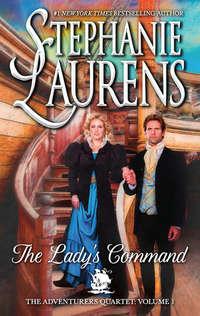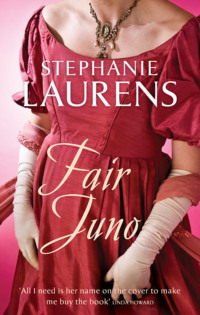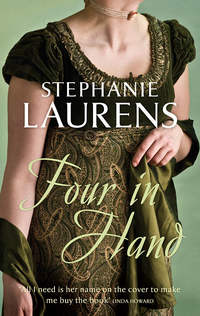
Полная версия
Tangled Reins
‘She is certainly that,’ he agreed.
They had reached a gate in the high stone wall that had bordered the lane for the last hundred yards. Dorothea stopped and reached for the basket. ‘These are the gardens of the Grange.’
‘Then I’ll leave you here,’ Hazelmere promptly replied. He had escorted her home purely to prolong his time in her company but had no wish to be seen with her. He knew too well the gossip and speculation which would inevitably spring from such a sighting. Expertly capturing her hand, he carried it to his lips, enjoying the spark of anger that flared in the green eyes and the blush that rose in response to his understanding smile. ‘But remember my warning! If you wish to keep in your grandmama’s good graces, don’t go about London unattended. Young ladies who venture the London streets alone won’t remain alone for long. Farewell, Miss Darent.’
Released, Dorothea opened the gate and made good her escape.
She hurried through the garden, for once unconscious of the heady scents rising from the rioting flowers. The long shadows cast by the ancient roof of the Grange fell across the path, heralding the end of the day. She stopped in the garden hall; the coolness of the dim, stone-flagged room brought relief to her burning cheeks. The clattering steps of the housemaid sounded in the passageway. Moving to the door, she called her in.
‘Take these berries to Cook, please, Doris. And after that you can lay out the meadowsweet on the drying racks.’ With a wave of her hand she indicated the wooden frames covered with tightly stretched muslin lying on the bench along one side of the room.
As an afterthought, she added, ‘And please tell my aunt I’ve gone to lie on my bed until dinner. I think I must have a touch of the sun.’ More accurately, a touch of the Marquis of Hazelmere! she thought furiously. Successfully negotiating the passageway and stairs undetected, she closed her bedchamber door and sank on to the window-seat.
Gazing over the now deeply shadowed garden, she struggled to bring some order to a mind still seething. Ridiculous! She had left the Grange a serenely confident twenty-two-year-old, entirely secure in her independent world. Yet here she was, a scant hour later, feeling, she suspected, as Cecily might if the Squire’s son had made eyes at her! It was not as if she had never been kissed before. It shouldn’t make the slightest difference who was doing the kissing. The fact that it had made a great deal of difference exacerbated a temper already tried by a pair of hazel eyes. A pair of all too perceptive hazel eyes. She spent the next ten minutes reading herself a determined lecture on the inadvisability of forming an attachment for a rake.
Fortified, she forced herself to consider the matter in a more reasoning light. Undoubtedly she should feel outraged, ready to decry the Marquis as a licentious scoundrel. Yet, despite her irritation, she was too honest not to admit that her inappropriate attire was partly to blame. Moreover, she suspected that the response of a young lady on finding herself in the arms of the Marquis of Hazelmere should have been quite different from the way she had behaved. In her defence, she felt it should be noted that had she swooned in his arms he would have had little choice but to wait with her until she recovered. Then the situation would have been, if anything, worse. By following this train of thought, she convinced herself there had been nothing particularly reprehensible about the proceedings after Lord Hazelmere had released her. In fact, he had proved a valuable informant on the subject of her grandmother.
What continued to bother her were the events preceding her release from that far too familiar embrace. Her fingers strayed to her lips, which, despite his expertise, were slightly bruised. The memory of his hard body against hers was still a physical sensation. The clock on the landing struck the quarter-hour. She determinedly put her thoughts on the afternoon’s events aside, resolutely consigning the Marquis and all his works to the remotest corner of her mind. Nothing was more certain than that he would forget all about her by tomorrow.
Changing out of her old gown and into the freshly pressed sprigged muslin laid out for the warm evening, she gauged her chances of unwittingly running into him again. Well versed in the ways of the local gentry, she knew it would be all but impossible for him to meet her socially in the country. And, by his own admission, he was not in the habit of remaining over-long at Moreton Park. She told herself she was relieved. To make doubly sure her relief remained undisturbed, she resolved that, in future, she would ensure that her reluctant sister joined her on her rambles.
Picking up a brush, she attacked her long tresses vigorously before winding them up in a simple knot. She glanced quickly at her reflection in the mirror perched on her tallboy. Satisfied she had dealt sufficiently with the potential ramifications of the advent of the Marquis of Hazelmere into her life, she went downstairs to her dinner.
A fortnight later, returning to Hazelmere House, his mansion in Cavendish Square, situated almost directly opposite Merion House, the Marquis found a large pile of letters and invitations awaiting him. Sorting through them, he strolled into his library. Extracting an envelope of a particularly virulent shade of purple from the bundle, he held it at arm’s length to escape the cloying perfume emanating from it and groped for his quizzing glass. Recognising the flowery script of his latest mistress, a dazzling creature abundantly well endowed for her station in life, his black brows drew together. He opened the letter and scanned the few lines within. The black brows rose. A smile of a kind Dorothea Darent would not have recognised twisted the mobile lips. Throwing both letter and envelope into the fire, he turned to his desk.
The footman who answered the summons of the library bell ten minutes later found his master fixing his seal to a letter. Glancing up as the door opened, Hazelmere waved the envelope to cool the wax, then held it out. ‘Deliver this by hand immediately.’
‘Yes, m’lord.’
Watching the retreating back of the footman, Hazelmere considered the probable reception of his politely savage missive. Thus ended yet another affaire. Stretching his long legs to the fire, he fell to considering the constantly changing parade of his high-flying mistresses. While providing the ton with a stream of on-dits, he felt that the inevitability of the game was beginning to bore him. After more than ten years on the town, there were few fashionable vices he had not sampled and the pattern of his activities was becoming wearyingly predictable.
Thinking again of the discarded Cerise, he compared her ripe beauty with that of the green-eyed girl whose face had proved disturbingly haunting. His dissatisfaction with his present lot stemmed in large part from that encounter in Moreton Park woods. Entirely his own fault, of course.
Marc St John Ralton Henry, at thirty-one years of age the fifth Marquis of Hazelmere and one of the wealthiest peers of the realm, let his mind wander back to the first time he had heard Miss Darent’s name, during a conversation he had had with his great-aunt the night before she died. A remarkably forthright old lady, she had fixed him with a steely look and embarked on an inquisition as to his marital intentions. This had been prefaced by the remark, ‘I know your mother won’t mention this, so I’m takin’ advantage of the fact that, as I’m dying, you can’t very well tell me to go to the devil!’
Appreciative of the ploy and having admitted he had no present plans in the matter, he had settled down to listen with good grace to the subsequent dissertation, something he would not have done had it been anyone else.
‘Can’t say I blame you for not wanting to marry any of these namby-pamby misses presented every year,’ she’d snorted derisively. ‘Can’t abide such ninny-hammers myself! But why not look to wider fields? There’s plenty of suitable chits who for one reason or another have never made it to London.’
Catching sight of his sceptical face, she had continued, ‘Oh, you needn’t think that just because they’re country misses they couldn’t handle life in the ton. There’s Dorothea Darent, for one. Young, beautiful, well dowered and as well born as yourself. The only reason she hasn’t been presented is that she’s spent the last six years running her widowed mother’s household. Cynthia Darent should be kicked for not bringing her out years ago!’ Here Great-Aunt Etta had paused, musing on the sins of the late Lady Darent. ‘Well, it’s too late for that now, ‘cause she’s dead.’
‘Who? The beautiful Dorothea?’ had asked Hazelmere, all at sea.
‘No, fool! Cynthia! She died a few months ago and the girls have gone to Darent Hall for a while. Pity. I should have liked to see Dorothea again. No namby-pamby miss, that one!’
‘How is it that, despite never having been presented, this paragon is not yet wed? Surely the country gentlemen are not such slowtops?’
Great-Aunt Etta had chuckled. ‘I rather suspect that’s because no gentleman has yet shown her any good reason to marry! Look at it from her point of view. She’s got position enough, wealth enough and her independence to boot. Why get married?’
He had grinned back, responding to the laughter in the old lady’s eyes. ‘I dare say I could make a few suggestions.’
‘Yes, I dare say you could! But that’s neither here nor there, for you’re not likely to meet her. Unless Hermione Merion takes an interest. I’ve written to her, so she may do. There’s Cecily too. The younger sister, and another beauty, though of a different style. She’ll have to be brought out, too. But Cecily would try the patience of a saint. And, as you definitely ain’t one, she won’t do for you. But enough of the Darent sisters. I merely give them as examples.’ And so the conversation had moved on.
The idea that Great-Aunt Etta had, in fact, been trying to make him look at Dorothea Darent as a potential wife had occurred to him shortly after he met that remarkable young lady.
Over the past ten years he had steadfastly refused to seriously consider any of the flighty young females paraded for his approval at Almack’s and the ton parties. This had caused considerable consternation among other family members, notably his two older sisters, Maria and Susan, who were constantly pushing one or other of their favoured aspirants in his way. His stance had been fully supported by his mother and Great-Aunt Etta, both of whom seemed to understand the almost suffocating boredom he felt within minutes of attempting to converse with the latest simpering and apparently witless offerings. He knew his mother longed for him to marry but had reputedly told an acquaintance that unless they changed the prevailing fashion in débutantes she never expected to see it. As for Great-Aunt Etta, she had never said a word to him on the subject until that night.
Given that Great-Aunt Etta had known him every bit as well as his mother, it was perfectly possible that she had intended to draw his attention to Miss Darent. She would never have been so gauche as to approach the matter directly, knowing that the most likely outcome by that route was polite and chilly refusal to have anything to do with the chit. Instead she had introduced her name in a roundabout fashion, merely telling him that the girl was in every way suitable, but leaving him to make his own ground. Very like Great-Aunt Etta! Well, Great-Aunt Etta, he mused with a smile, I’ve met your Dorothea, and in a more effective way than I think even you would have dreamt of!
Chapter Two

A low moan brought Dorothea’s head around sharply to peer through the dim light at her sister, curled in the opposite corner of the carriage. Cecily’s eyes were shut but the line between her fair brows showed clearly that she was far from sleep. She moved her head restlessly on the squabs. The coach lurched into a rut as the horses’ hoofs skidded on the icy road. Dorothea caught the swinging strap to stop herself from being thrown. As the coach ponderously righted itself and resumed its steady progress she saw that Cecily had drawn herself up into a tight ball and wedged herself firmly into the corner, her face turned away.
Dorothea returned her attention to the dreary landscape, glimpsed fitfully through the bare branches of the trees and hedges lining the road. The grey February afternoon was closing in. The patter of drizzle on the coach windows punctuated the stillness within. Then, rising like a castle through the gathering gloom, standing on a crest surrounded by the dark shadows of its windbreaks, loomed the Three Feathers Inn. As it was just over halfway to London from the Grange, situated on the Bath Road, she had chosen it as their overnight stop. If it had been only herself travelling to London she would have made the journey in a single day. But Cecily was a poor traveller. With luck, their slow pace broken by a night’s rest would allow her to arrive in Cavendish Square in a fit state to greet their grandmother.
The only other occupant of the carriage was their middle-aged maid, Betsy, who had tended them from the cradle. She dozed lightly, enveloped in woollen shawls on the seat facing Dorothea. After much consideration, Aunt Agnes had been left behind. There had been nothing specific in Lady Merion’s letter summoning them to London, but the discussions at Darent Hall had clearly been on the unspoken understanding that Aunt Agnes would continue to do her duty and escort her charges to Cavendish Square. However, Aunt Agnes’s rheumatism was legendary, and Dorothea had no wish to saddle herself with the querulous, though much loved old lady, either on the road to London or once they were arrived, supposedly to enjoy themselves. Furthermore, Aunt Agnes’s opinions on men, of whatever station, were dampening in the extreme. Dorothea thought it unlikely that her presence would aid in the push to find Cecily a husband. Nevertheless, her polite note to Lady Merion, informing her of their expected date of arrival, had made no reference whatever to Aunt Agnes.
The coach lumbered on through the steadily thickening mists. It had been overcast all day, but for the most part the rain had held off, much to the relief of their coachman, Lang. The journey to London with the roads only just cleared was always a risky business. Wrapped in his thick frieze coat, he was deeply relieved to turn his team in under the arch of the inn. It was a large establishment, one of the busiest posting houses in the district. The main yard was devoted primarily to travellers changing horses or temporarily halting. The large travelling carriage rumbled through and on under another archway into the coachyard. Ostlers ran to free the steaming horses, and the landlord came forward to assist the sisters into the inn.
Here, however, a problem lay waiting.
While they warmed themselves before the roaring fire in a snug, low-ceilinged parlour Mr Simms apologised profusely. ‘There’s a prize-fight on in the village, miss. We’re booked out. I’ve kept a bedchamber for you, but I’m afraid there’s no hope of a private parlour.’ The rubicund landlord, middle-aged, with daughters of his own, eyed the young ladies anxiously.
Dorothea drew a deep breath. After travelling at a snail’s pace all day she did not really care what was going forward in the neighbourhood, as long as she and Cecily were adequately housed for the night. She automatically appraised the neat and spotlessly clean room. At least there would be no danger of damp sheets or poorly cooked food in this house. There was no point in being overly distressed by the lack of a parlour. Drawing herself to her full height, she nodded to the clearly worried Simms. ‘Very well. I see it can’t be helped. Will you please show us to our bedchamber?’
Mr Simms had correctly guessed the Darent sisters’ station from Dorothea’s letter requesting bedchambers and parlour. While he rarely criticised the ways of his clients, he thought it a crying shame that two such pretty young ladies were travelling escorted only by servants. He led them up to the bedchamber he had had prepared for them. Experience of the goings-on likely to occur within his house before the night was through had led him to house them in the large bedchamber on the north side of the inn. This was the oldest part of the rambling building, isolated from the rest, and reached only by a separate stairway close to his private domain.
Arriving, puffing, on the landing, he threw open a stout door. ‘I’ve put you in this bedchamber here, miss, because it’s out of the way, like. The inn will soon be fair to burstin’ with all the young gentlemen been to see the fight. My missus says to tell ye to stay put in your chamber and lock the door and she’ll see to it that only she and my daughter come up with your meals and suchlike. That road, we’ll all like as not avoid any unpleasantness. I’ll have your bags brought up in a jiffy, miss.’ With these words Simms bowed and retreated, leaving Dorothea, brows flying, and Cecily, pathetically pale, staring at each other in consternation.
‘Oh, my!’ said Betsy, sinking down on one of the chairs by the fire, eyes round with dismay. ‘Maybe we should travel on, Miss Dorothea. I’m sure your grandma wouldn’t like you staying at an inn with all these rowdy, boisterous, ramshackle lads, miss!’
‘I don’t believe there’s any other inn near, Betsy. And after all, as the landlord says, if we keep the door locked and stay in our room, surely we’ll come to no harm?’ Dorothea spoke in her normal calm tones, drawing off her gloves and dropping her travelling cloak over a chair. After her momentary dismay, undoubtedly due to tiredness, she was inclined to dismiss the situation.
‘Well, if it’s all the same to you, Thea, I would much rather stay here than try to go on,’ said Cecily.
The thin, reedy voice clearly conveyed to Dorothea just how unwell her sister was feeling. She walked briskly to the bed and turned down the coverlet. The sheets were dry and clean. She plumped up the pillows invitingly. ‘And so we shall, my love! Why not curl up on the bed until dinner arrives? I must confess, I’m not convinced that removing from here wouldn’t land us in a worse pickle than the one we’re in at present.’
A tentative knock came at the door. ‘Who is it?’ said Betsy, rising.
‘It’s only me, ma’am. Hannah, the landlord’s daughter.’
Betsy opened the door to reveal a stout damsel with a mobcap perched above a comely face. ‘My mum will have the dinner ready shortly, but she was wanting to know if you needed anything else, ma’am?’ Hannah hefted the sisters’ bags into the room and stood looking enquiringly at Dorothea.
‘Why, yes! We’d like some warm water, and could a truckle-bed be put up in here for our maid? I’d rather she spent the night with us.’
The girl nodded. ‘I’ll be back in two shakes, ma’am.’
Five minutes later Hannah was back with a jug of steaming water and a truckle-bed in bits. While she and Betsy struggled with this contraption Dorothea and Cecily washed the dust of the road from their faces and felt considerably better. Finally conquering the recalcitrant truckle-bed, Hannah wiped her hands on her apron and addressed Dorothea. ‘I’ll be back in half’n hour with your dinner, miss. Be you sure to lock the door after me.’
Dorothea murmured her thanks as the bolts slid to behind the helpful Hannah. Cecily, drowsy, curled up on the bed. Betsy sat by the fire, working on some sewing she had brought with her to while away the time.
Now that her immediate needs were satisfied, Dorothea prowled the room, restless and cramped. After a day spent in the carriage, she longed to get just one breath of fresh air before a night spent within the airless cocoon of the bedchamber. Suddenly she remembered Lang. With Cecily as passenger, they would normally leave mid-morning. However, her limited knowledge of prize-fights and their aftermath suggested that an early departure might be preferable. She looked out of the window, but this faced the back of the inn. She could hear no noise or ruckus to suggest that the audience from the fight had arrived.
Quickly she crossed to Betsy’s side. ‘I’m just going down to see Lang. We should make an early start tomorrow to avoid the crush.’ She had lowered her voice. ‘You stay here and watch over Cecily. I’ll only be a moment.’
Before Betsy could protest she picked up her old travelling cloak and whisked herself out of the door. She paused on the landing to fasten the cloak. Sounds of ribald laughter came, muted, from where she supposed the taproom to be. She made her way quietly down the stairs and along the corridor in the opposite direction, eventually reaching the door giving on to the coaching yard. Here she found a mêlée of ostlers and horses. Pausing in the shadows, she scanned the area, trying to locate Lang. He was nowhere to be seen. Remembering that private grooms often helped the ostlers at times like these, she ventured to the archway and peeked into the main stableyard.
‘My, my! What have we here? A pretty young thing, come to help us celebrate!’
She gasped. The sensation of an arm slipping around her waist made her heart stand still, but instead of hazel eyes lazily regarding her she found herself looking into a vacuous face with cherubic blue eyes that seemed to have trouble focusing. The man holding her had been drinking but he was not altogether drunk.
He dragged her, struggling furiously, around the corner to fetch up within a riotous group of seven semi-drunk gentlemen, intent on a night of carousing, having watched their favourite win the fight. Dorothea realised her mistake too late. The main yard of the inn was full to overflowing. One of the men reached out and flicked her hood back, and the light from the inn’s main door fell full on her face. She tried desperately to pull free, but the young man had a good grip on her arm. She winced as it tightened.
Immediately a drawling voice cut through the clamour. ‘Do let the lady go, Tremlow. She is known to me and I really cannot let you embarrass her further.’
Recognising the voice, Dorothea wished the ground would open up and swallow her.
The effect of the statement was instantaneous. The hold on her arm was immediately withdrawn as the dark shadow of the Marquis of Hazelmere materialised at the edge of the group.
‘Oh! Sorry, Hazelmere! No idea she was a lady.’
This last sentence, uttered sotto voce, made Dorothea’s cheeks burn. She pulled up her hood as the men in the group peered to see which lady could thus claim Hazelmere’s protection.
The Marquis, unhurriedly strolling across the group to her side, largely obscured her from view. Arriving beside her, he turned to the group and continued in the same languid tone, ‘I feel sure you would all like to offer your apologies for any embarrassment you have, however unwittingly, caused the lady.’
A chorus of, ‘Oh, yes! Definitely! Apologies, ma’am! No offence intended, y’know!’ greeted this bald statement.
Simms, having noticed the problem rather late in the day, now hung on the fringe of the group, waiting to render any assistance at all to one of his most valued customers. The Marquis’s eye alighted on him. ‘Ah, Simms! A round of ale for these gentlemen after this slight misunderstanding, don’t you think?’
Simms took the hint. ‘Yes, m’lord! Certainly! If you gentlemen would like to come this way I’ve a hogshead of a new brew I’d much appreciate your comments on.’ With this treat on offer, he had little difficulty in herding the group towards the taproom.
As they moved away Anthony, Lord Fanshawe appeared at his friend’s side, a questioning lift to his brows. One moment he had been walking across the stableyard beside Hazelmere, heading towards a hot dinner, when Marc had suddenly stopped, uttered one furious oath and then plunged through the crowd towards a small group of revellers near the coachyard. Although nearly as tall as his friend, with Marc ahead of him, he had had no chance to see what had attracted his attention. As he drew closer he heard Marc at his most languid. He assumed there was a lady in it somewhere, but it was only when Hazelmere turned to address some remark behind him that he realised he was effectively protecting her from the eyes of the stableyard.









